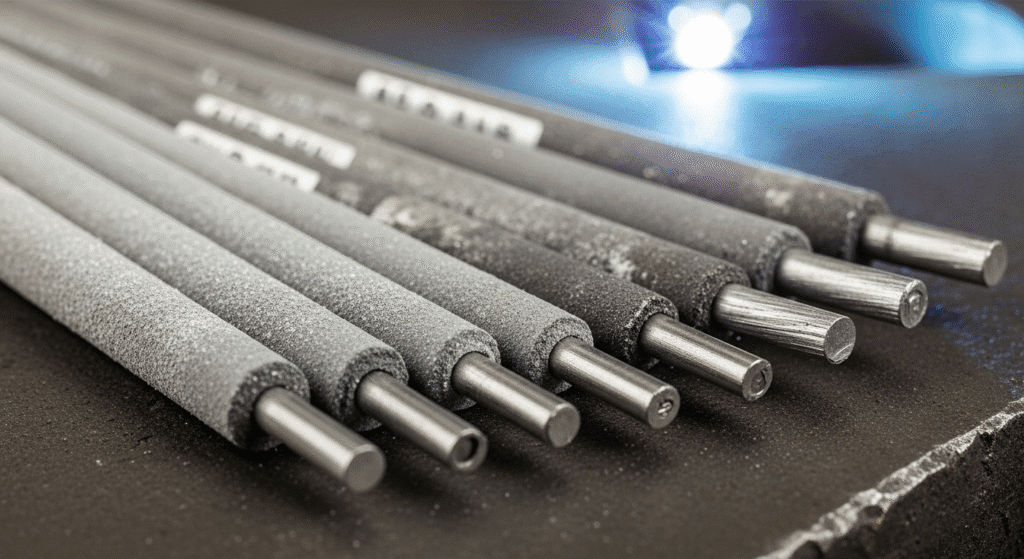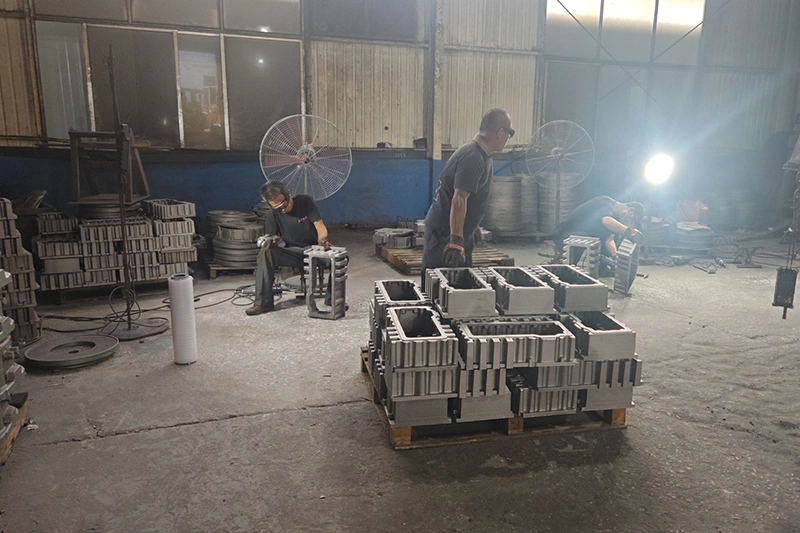Selecting the right stick electrode for welding cast iron determines whether your weld will crack, hold strong, or fail completely. Cast iron’s high carbon content and brittleness make it one of the trickiest metals to weld, but choosing the correct electrode transforms this challenging task into a manageable project.
The three main electrode categories for cast iron are nickel-based (most versatile), steel-based (economical but limited), and specialty electrodes (for specific applications). Your choice depends on the type of repair, stress requirements, and whether you need to machine the weld afterward.

Nickel-based electrodes are the gold standard for welding cast iron because they produce soft, machinable welds that resist cracking. These electrodes work by depositing nickel-rich weld metal that stays ductile even when mixed with the high-carbon cast iron base metal.
ENi-CI electrodes contain 99% pure nickel and create the strongest, most crack-resistant welds on cast iron. The pure nickel deposit stays soft and ductile, absorbing the stress that would normally crack a rigid weld.
These electrodes excel at repairing expensive castings, engine blocks, and precision machinery parts where failure isn’t an option. The weld metal machines beautifully, matching the surrounding cast iron’s workability.
The main drawback is cost—ENi-CI electrodes cost 3-4 times more than standard welding rods. Reserve them for critical repairs where weld quality justifies the expense.
ENiFe-CI electrodes blend 55% nickel with 45% iron, offering good crack resistance at a lower cost than pure nickel electrodes. This composition provides about 85% of the performance of ENi-CI electrodes at roughly 60% of the price.
These electrodes work best for general repairs, non-critical castings, and situations where some hardness in the weld zone is acceptable. The iron content makes the weld slightly harder than pure nickel deposits, but it’s still machinable with carbide tools.
Choose ENiFe-CI when you need reliable results without breaking the budget on electrode costs.
Steel electrodes offer the cheapest option for welding cast iron, but they produce hard, brittle welds prone to cracking. The steel deposit doesn’t mix well with cast iron’s high carbon content, creating a rigid heat-affected zone.
Use steel electrodes only for temporary repairs, non-structural applications, or when you can’t justify the cost of nickel electrodes. Pre-heating the entire casting to 500-1200°F helps reduce cracking, but this isn’t always practical.
Common steel electrodes like E7018 can work for filling surface defects or building up worn areas that won’t see high stress. Just expect to deal with potential cracks and difficulty machining the weld area.
Specialty electrodes fill specific niches in cast iron welding where standard options fall short. ENiCu electrodes (67% nickel, 30% copper) produce the softest, most machinable welds but with lower strength than other nickel alloys.
These electrodes shine when joining cast iron to steel or repairing thin-section castings where minimal heat input prevents distortion. The copper content keeps the weld puddle fluid at lower temperatures.
Other specialty options include flux-coated cast iron rods for oxyacetylene welding and maintenance electrodes designed for dirty or contaminated castings.
Repairs benefit most from nickel-based electrodes since they accommodate the unpredictable stresses in damaged castings. Choose ENi-CI for critical repairs or ENiFe-CI for general fixes.
High-stress applications demand ENi-CI electrodes exclusively. The pure nickel deposit provides maximum ductility to handle cyclic loading, vibration, and thermal expansion without cracking.
Low-stress repairs open up all electrode options, including economical steel rods. Choose based on whether you need to machine the weld (use nickel) or just fill a void (steel works fine).
Machining requirements immediately narrow your choices to nickel-based or nickel-copper electrodes. ENiCu produces the softest welds, while ENi-CI offers the best balance of machinability and strength.
Complex castings with multiple intersecting walls need maximum crack resistance from ENi-CI electrodes. The pure nickel absorbs differential cooling stresses that would crack other weld metals.
Contaminated castings respond best to ENiFe-CI electrodes, which tolerate oil, grease, and embedded dirt better than pure nickel. The iron content helps the arc burn through contaminants.
Joining cast iron to steel requires ENiCu or ENiFe-CI electrodes that bridge the metallurgical gap between these dissimilar metals. The nickel content bonds well to both materials.
High-temperature applications above 700°F need specialty high-nickel electrodes designed to maintain strength at elevated temperatures. Standard ENi-CI works up to 700°F.
ENiFe-CI (Nickel 55) electrodes offer the best all-around performance for general repairs. They provide good crack resistance, reasonable machinability, and moderate cost, making them suitable for about 70% of cast iron welding jobs.
Nickel electrodes cost more because nickel itself is an expensive metal, often priced 10-20 times higher than steel. The metallurgical properties that make nickel ideal for cast iron welding—ductility, corrosion resistance, and compatibility—come at a premium price.

